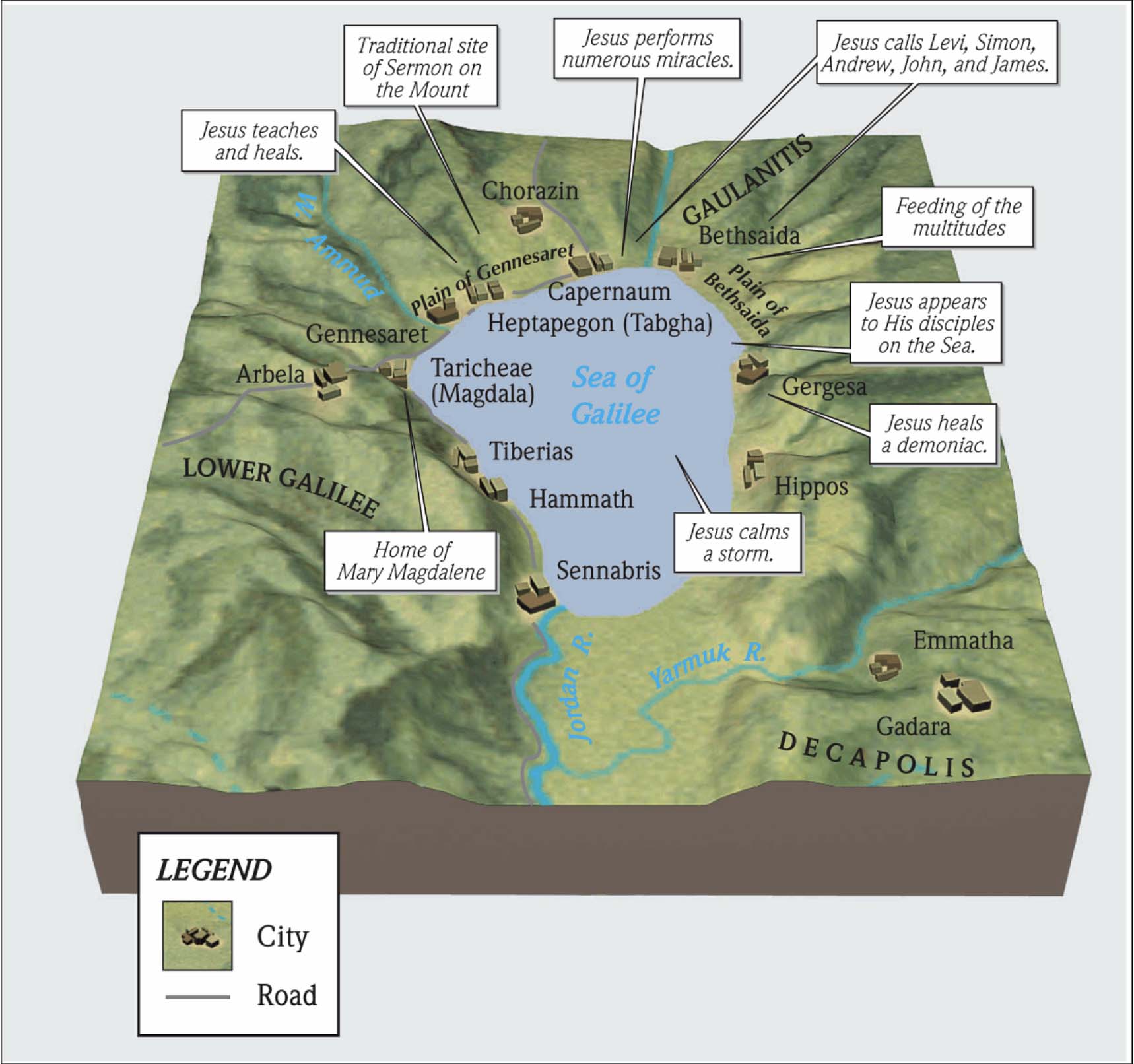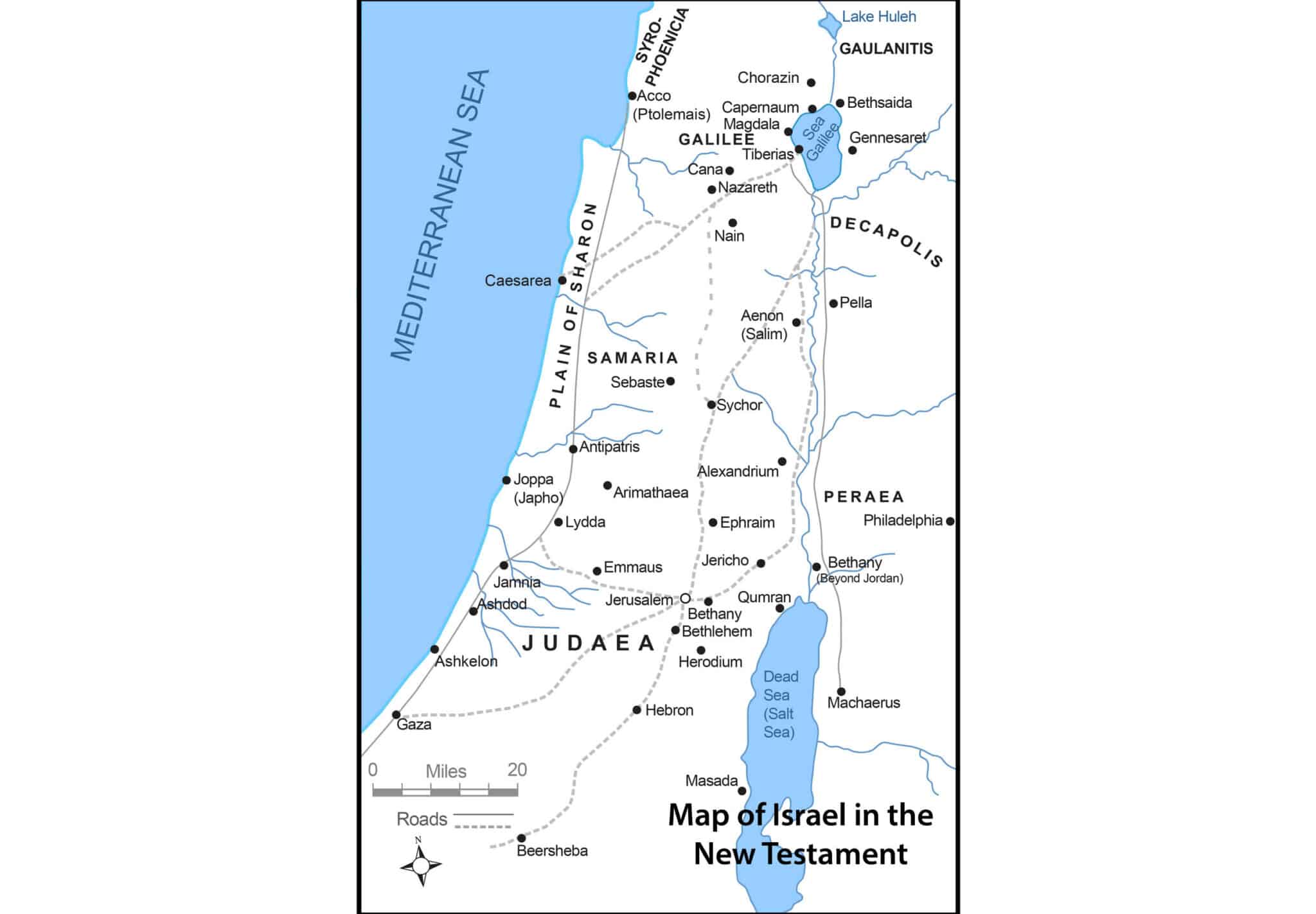The devil tempts Jesus a third time by offering Him immediate power and glory in exchange for worshiping him. Jesus rebukes him to depart and quotes Deuteronomy a third time. The devil flees and Jesus is ministered to by angels.
The parallel account of this event is found in Luke 4:5-8; 13.
Each of these three temptations can be seen as corresponding to what the aged disciple, John refers to in one of his letters as the “lust of the flesh, the lust of the eyes, and the boastful pride of life”:
“Do not love the world nor the things in the world. If anyone loves the world, the love of the Father is not in him. For all that is in the world, the lust of the flesh and the lust of the eyes and the boastful pride of life, is not from the Father, but is from the world. The world is passing away, and also its lusts; but the one who does the will of God lives forever” (1 John 2:15-17).
The tempter’s first temptation to turn stone into bread is an example of the lust of the flesh. It focuses on appetites. By creating the mental image of bread, it could also focus on lust of the eyes, or senses. The tempter’s second temptation of jumping off the Temple, potentially creating a spectacle for all to see, might correspond to the lust of the eyes. It might also overlap with the boastful pride of life, in that Jesus would be demanding particular behavior from His Father. It lusts after control, and the esteem and reputation of others.
The tempter’s third temptation is the offer of giving kingly power to Jesus in exchange for worship. This is an instance of the boastful pride of life. Jesus does not contest that Satan has the power to give Him rulership over the earth. But He refuses the counterfeit of passing riches, temporary position, and fading glory of this life in exchange for eternal goods that would not fade away. Jesus declines the offer to take a “short cut.”
For the third temptation, the devil took Him to a very high mountain and showed Him all the kingdoms of the world and their glory (v 8). This could have been a literal mountain, or the devil could have shown these things to Jesus in a vision. All the kingdoms of the world and their glory could refer to all the earthly kingdoms that existed at that time—including Rome; or it could refer to all the kingdoms throughout the history of the world, all the kingdoms that were yet to come (v 8). Or it could be both. Each kingdom would involve a political power structure, with rulers and subjects. The glory of a kingdom stems from the accomplishments of its people, who serve under the sovereign. When Satan says All these things I will give You, Satan is referring to the authority to rule over all the kingdoms (v 9).
It is important to note what Jesus does not say to this offer; Jesus does not tell Satan that it is impossible for him to give away all the kingdoms of the world (v 8). This raises the interesting reality that Satan is still the ruler of this world. Jesus referred to Satan as the “ruler of this world” in John 14:30 and John 16:11. He states that by completing His work “the ruler of this world will be cast out” (John 12:31). Therefore, while Satan is currently the ruler of this world, he is a “lame duck” ruler. He still occupies the position, although he has been defeated and it is certain he will be replaced. Of course, Satan will be replaced as the ruler of this world by Jesus, who will become the ruler of the world as King of kings and Lord of lords (Revelation 19:11-16).
Satan currently has free access to both heaven and earth. We see this in the first chapter of the book of Job. We also observe in the book of Revelation that as the end approaches for the age of this world and this earth, Satan is cast out of heaven (Revelation 12:7-13). He ultimately is cast into the lake of fire (Revelation 20:10).
In exchange for becoming the ruler over all these things, the devil tells Jesus that he must fall down and worship him (v 9). Jesus knows the earth will be His to rule. But Satan offers a short cut. A path where Jesus can skip the suffering of the Cross and rule the kingdoms of the earth immediately. The logic might be “You are going to get this anyway, why not skip all that suffering and just have it now. I will gladly provide it, only acknowledge one thing, that you will now work for me instead of working for your Father.” Satan offers an easier path. An immediate path. But Jesus knows better than to worship Satan. He knows that Satan promises everything, but delivers nothing.
If Jesus were to succumb to the tempter’s offer, He would immediately become the ruler of the world for this age. However, He would have submitted to Satan and rejected God. The Bible occasionally tells us what would have happened. In this case it does not. It seems reasonable that Satan’s scheme would be that he could avoid being displaced as “ruler of this world” if he could get the one anointed to take his place to work for him.
By submitting to God, and steadfastly obeying Him, Jesus is able to endure the humility and suffering, and despise the shame of the cross for the joy set before Him (Philippians 2:5-11; Hebrews 12:2). The “joy set before him” was to sit down “at the right hand of the throne of God” (Hebrews 12:2). In realms with kings, it was a capital offense to sit in the presence of the king, unless you were also royalty. To sit down at the right hand of the throne of God is a symbol of reigning. Jesus waited to be installed as ruler of the world until God did it in His appointed time and manner. Therefore, Jesus will sit on the throne forever.
After the devil makes his illicit offer, Jesus tells him to depart, Go, Satan! Jesus did what his half-brother James will later counsel his readers to do whenever they face temptation. “Submit therefore to God. Resist the devil and he will flee from you” (James 4:7). In his rebuke, Jesus quotes Deuteronomy a third time: “For it is written, ‘You shall worship the Lord your God, and serve Him only’” (v 10). The fuller passage from Deuteronomy continues by stating the negative command not to worship other gods and ends with a warning that disobeying this command will surely provoke God’s anger and “He will wipe you off the face of the earth” (Deuteronomy 6:13-15). This divine rebuke reminds the devil that his time to reign is short. Defeated by Jesus, the devil left Him (v 11).
Satan fled at this time, but he did not give up. The gospel of Luke’s account of the temptations of Jesus adds that “When the devil had finished every temptation, he left Him until an opportune time” (Luke 4:13). Matthew then tells us that after these encounters, angels came and began to minister to Him (v 11). This may refer to their strengthening Jesus physically after fasting for forty days and forty nights in the extreme climate of the wilderness. If so, that means Jesus was provided food miraculously, just as the Israelites were provided manna in the wilderness, but not through Jesus doing a miracle on behalf of Himself. He continues to live in dependence throughout His wilderness experience. This is one of the primary learning opportunities available in a wilderness experience, to learn to walk in complete dependence on God.
We are not told how Matthew came to know of this episode. We might presume that Jesus told His disciples about it as a means of instruction. Matthew’s inclusion of this experience immediately after God’s pronouncement that Jesus “is my beloved Son, in whom I am well-pleased” (Matthew 3:17) indicates that Matthew desired to instruct believers that God allows testing for those living a life that pleases Him. It is preparation for great service. By noting how Jesus resisted, Matthew also instructs us how to resist, by clinging to God’s perspective through His written word.
The fact that Jesus quotes from Deuteronomy three times likely emphasizes to Matthew’s Jewish audience that Jesus is the fulfillment of Deuteronomy 18:15, where Moses says “The LORD your God will raise up for you a prophet like me from among you, from your countrymen, you shall listen to him.” God tells Moses that He will “raise up a prophet from among their countrymen like you and I will put My words in his mouth, and he shall speak to them all that I command him” (Deuteronomy 18:18).
This is in response to the Israelites begging Moses to ask God no longer to speak to them directly, as He did from Mount Horeb (Sinai), lest they die. God answers that He will raise up a Second Moses who will be a man, like them. This Second Moses will have God’s words in His mouth, and speak what He is commanded. Matthew’s telling of Jesus’ temptation presents Jesus as the Second Moses who speaks God’s words and submits to God’s commands. Jesus will shortly speak God’s words in the Sermon on the Mount as a Second Lawgiver. This will present another picture of Jesus as the Second Moses, presenting a new covenant where the law is written on the believer’s heart rather than on a tablet of stone (Jeremiah 31:33; Hebrews 10:16). Jesus is the Messiah, the heir to the throne of David (2 Samuel 7:13), the Second Moses, and God in human flesh. The Apostle Paul will also tell us He is the Second Adam (Romans 5:14) and a King-Priest according to the pattern of the Old Testament king-priest Melchizedek (Hebrews 7).
The Bible contains a consistent pattern of the second being elevated above the first. King David was the second king of Israel, and was superior to Saul, the first king. Jacob the second-born was elevated over Esau the firstborn to possess the birthright. Jacob was renamed Israel and became the father of a chosen people. Humans were chosen to rule the earth in place of Lucifer, even though humans are lower than angels (Psalm 8; Isaiah 14:12-15). Though humans fell, they are redeemed through Jesus, the God-Man (Hebrews 2:5-18) who will lead them to reign over the earth and share His throne (Revelation 3:21; 5:10).
Biblical Text
8 Again, the devil took Him to a very high mountain and showed Him all the kingdoms of the world and their glory; 9 and he said to Him, “All these things I will give You, if You fall down and worship me.” 10 Then Jesus said to him, “Go, Satan! For it is written, ‘You shall worship the Lord your God, and serve Him only.’” 11 Then the devil left Him; and behold, angels came and began to minister to Him.
Check out our other commentaries:
-
Matthew 2:7-8 meaning
Herod intends to kill the child sought by the magi and end the threat to his rule. He treacherously summons the magi to determine precisely...... -
Genesis 23:17-20 meaning
hron’s field and cave are deeded over to Abraham and become his property. This is witnessed by the sons of Heth. Abraham buries Sarah in...... -
Romans 13:11-14 meaning
We should live righteously, harmoniously together through faith because we will soon be with God. Paul has shown us how we should live and is...... -
Galatians 6:17-18 meaning
Paul says goodbye, and appeals to the Galatians to remain in the truth. He has suffered for Jesus, which shows his sincerity, so Paul hopes...... -
Exodus 37:10-16 meaning
The table of showbread and the items required to carry it are constructed.......




